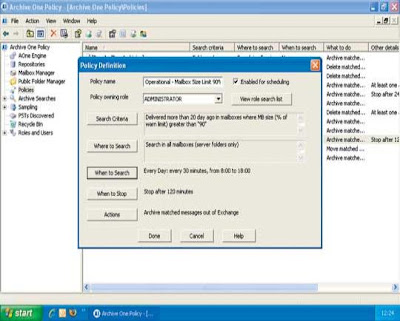 The simple way to keep on top of your Exchange storage
The simple way to keep on top of your Exchange storagePros: Message archiving to any network-accessible storage; flexible policy-driven configuration; simple management interface; PST archiving and migration; pre-indexing and comprehensive search tools
Cons: Careful planning required for maximum benefit
Overall: A well-conceived and easy-to-implement Exchange storage management tool that can enhance performance and reduce costs
Price: £10-£40 per user depending on volume
Manufacturer: C2C
No matter how well you manage your Exchange Server, the amount of storage it consumes is bound to be an issue.
Archive One Policy Manager addresses this by providing tools to archive large parts of the Exchange message store out to alternative locations, yet still provide users with seamless access to the information.
Archive One Policy manager works with any version of Exchange from 2000 onwards, including the Small Business Server implementation.
System requirements are minimal, just a reasonably specified Windows host, which can be the Exchange server itself if you want, although for large installs a dedicated system is recommended.
There’s no need for an SQL database and the repositories to hold archive messages can be created on any network-accessible storage, from direct-attached disks to network-attached storage (Nas) and storage-area network (San) systems. Integration with leading storage management and backup systems is also available.
A Microsoft Management Console (MMC) snap-in manages the software with a wizard to guide you through initial deployment. Care is needed to make sure you build a suitable set of repositories and the most common approach is to build a separate repository for each year. That said, you could opt to archive by department or user group, customer, project and so on.
The next task is to configure policies to tell the software the archive criteria to apply – for example, to move messages to the correct repository based on the date of sending. Polices can then be scheduled to run in fixed time slots to fit in with backup schedules.
Controls over the amount of processing power consumed, and a number of preconfigured policies are included to help get you started. However, these really are just a start and any number can be defined with 46 selection criteria available and 23 Boolean logic options, giving thousands of options.
From the user’s perspective not a lot appears to change when Archive One starts working. Messages can still be accessed from Outlook and Outlook Web Access, although those that have been archived are marked with a special icon, with a brief preview available rather than the full content.
A hyperlink then gives access to the full message, with support for double-click retrieval in Outlook if the optional Quicklink client is installed, and pre-indexing for rapid searching.
In terms of benefits, the most obvious is the ability to reduce the amount of data directly managed by Exchange, reducing storage costs and improving performance. Backup times are similarly minimised, with data in repositories compressed and, once created, never modified, making them much easier to protect compared to dynamic message stores.
However, that’s not all you get, Archive One Policy Manager adds indexed search and message management facilities, to enable information to be retrieved far more quickly and effectively.
Compliance issues can also be addressed more easily and you can even locate and manage information held in local PST files, optionally migrating data back to the Exchange server store if wanted. Plus it’s all pretty seamless and, for the most part self managing, with built-in reporting and auditing tools to keep track of what’s going on.
We found it very easy to install, manage and use, but smaller companies may need assistance, which is available both from C2C and its resellers.

0 comments: